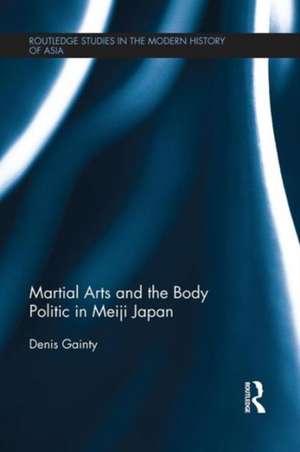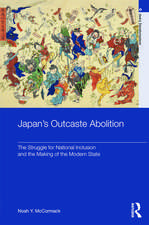Martial Arts and the Body Politic in Meiji Japan: Routledge Studies in the Modern History of Asia
Autor Denis Gaintyen Limba Engleză Paperback – 4 aug 2015
This book shows how the notion and practice of Japanese martial arts in the late Meiji period brought Japanese bodies, Japanese nationalisms, and the Japanese state into sustained contact and dynamic engagement with one another. Using a range of disciplinary approaches, Denis Gainty shows how the metaphor of a national body and the cultural and historical meanings of martial arts were celebrated and appropriated by modern Japanese at all levels of society, allowing them to participate powerfully in shaping the modern Japanese nation and state. While recent works have cast modern Japanese and their bodies as subject to state domination and elite control, this book argues that having a body – being a body, and through that body experiencing and shaping social, political, and even cosmic realities – is an important and underexamined aspect of the late Meiji period.
Martial Arts and the Body Politic in Meiji Japan is an important contribution to debates in Japanese and Asian social sciences, theories of the body and its role in modern historiography, and related questions of power and agency by suggesting a new and dramatic role for human bodies in the shaping of modern states and societies. As such, it will be valuable to students and scholars of Japanese studies, Japanese history, modern nations and nationalisms, and sport and leisure studies, as well as those interested in the body more broadly.
| Toate formatele și edițiile | Preț | Express |
|---|---|---|
| Paperback (1) | 482.74 lei 6-8 săpt. | |
| Taylor & Francis – 4 aug 2015 | 482.74 lei 6-8 săpt. | |
| Hardback (1) | 1057.75 lei 6-8 săpt. | |
| Taylor & Francis – 21 mar 2013 | 1057.75 lei 6-8 săpt. |
Din seria Routledge Studies in the Modern History of Asia
-
 Preț: 311.33 lei
Preț: 311.33 lei -
 Preț: 311.41 lei
Preț: 311.41 lei -
 Preț: 317.76 lei
Preț: 317.76 lei -
 Preț: 310.95 lei
Preț: 310.95 lei -
 Preț: 311.91 lei
Preț: 311.91 lei - 9%
 Preț: 901.50 lei
Preț: 901.50 lei -
 Preț: 379.30 lei
Preț: 379.30 lei - 25%
 Preț: 711.72 lei
Preț: 711.72 lei - 18%
 Preț: 1278.70 lei
Preț: 1278.70 lei - 18%
 Preț: 948.84 lei
Preț: 948.84 lei - 18%
 Preț: 1055.21 lei
Preț: 1055.21 lei - 18%
 Preț: 1331.76 lei
Preț: 1331.76 lei - 18%
 Preț: 1003.30 lei
Preț: 1003.30 lei - 18%
 Preț: 1060.87 lei
Preț: 1060.87 lei -
 Preț: 424.87 lei
Preț: 424.87 lei -
 Preț: 485.94 lei
Preț: 485.94 lei - 18%
 Preț: 1004.86 lei
Preț: 1004.86 lei - 18%
 Preț: 1326.99 lei
Preț: 1326.99 lei - 18%
 Preț: 1060.87 lei
Preț: 1060.87 lei - 18%
 Preț: 1058.65 lei
Preț: 1058.65 lei -
 Preț: 441.80 lei
Preț: 441.80 lei - 28%
 Preț: 820.03 lei
Preț: 820.03 lei - 18%
 Preț: 1059.84 lei
Preț: 1059.84 lei - 28%
 Preț: 821.79 lei
Preț: 821.79 lei - 18%
 Preț: 1063.65 lei
Preț: 1063.65 lei - 18%
 Preț: 1059.84 lei
Preț: 1059.84 lei - 49%
 Preț: 218.36 lei
Preț: 218.36 lei - 18%
 Preț: 704.83 lei
Preț: 704.83 lei - 18%
 Preț: 1012.10 lei
Preț: 1012.10 lei - 25%
 Preț: 826.86 lei
Preț: 826.86 lei - 18%
 Preț: 1002.63 lei
Preț: 1002.63 lei - 15%
 Preț: 699.14 lei
Preț: 699.14 lei - 18%
 Preț: 1114.30 lei
Preț: 1114.30 lei - 27%
 Preț: 995.07 lei
Preț: 995.07 lei - 26%
 Preț: 765.01 lei
Preț: 765.01 lei - 18%
 Preț: 1059.84 lei
Preț: 1059.84 lei - 26%
 Preț: 821.94 lei
Preț: 821.94 lei - 18%
 Preț: 1056.00 lei
Preț: 1056.00 lei - 18%
 Preț: 1006.07 lei
Preț: 1006.07 lei -
 Preț: 488.71 lei
Preț: 488.71 lei - 18%
 Preț: 999.46 lei
Preț: 999.46 lei - 18%
 Preț: 1051.55 lei
Preț: 1051.55 lei - 18%
 Preț: 1065.78 lei
Preț: 1065.78 lei - 25%
 Preț: 769.10 lei
Preț: 769.10 lei - 18%
 Preț: 1054.43 lei
Preț: 1054.43 lei - 26%
 Preț: 765.01 lei
Preț: 765.01 lei - 18%
 Preț: 1009.21 lei
Preț: 1009.21 lei
Preț: 482.74 lei
Nou
Puncte Express: 724
Preț estimativ în valută:
92.37€ • 96.44$ • 76.45£
92.37€ • 96.44$ • 76.45£
Carte tipărită la comandă
Livrare economică 04-18 aprilie
Preluare comenzi: 021 569.72.76
Specificații
ISBN-13: 9781138121010
ISBN-10: 1138121010
Pagini: 208
Ilustrații: 36
Dimensiuni: 156 x 234 x 11 mm
Greutate: 0.3 kg
Ediția:1
Editura: Taylor & Francis
Colecția Routledge
Seria Routledge Studies in the Modern History of Asia
Locul publicării:Oxford, United Kingdom
ISBN-10: 1138121010
Pagini: 208
Ilustrații: 36
Dimensiuni: 156 x 234 x 11 mm
Greutate: 0.3 kg
Ediția:1
Editura: Taylor & Francis
Colecția Routledge
Seria Routledge Studies in the Modern History of Asia
Locul publicării:Oxford, United Kingdom
Public țintă
Postgraduate and UndergraduateCuprins
1. Introduction 2. The Context for the Butokukai: The Development of Martial Arts and the Samurai as Cultural Forms in Tokugawa and Early Meiji 3. The Dainippon Butokukai: Its Founding, Growth, and Dissolution 4. Capture the Flag: Spectacle and Rhetoric 5. Talking Teaching: The Rhetoric of Martial Arts in Physical Education 6. Giving the State its Legs: Rethinking Agency and the Body through the Butokukai 7. Conclusion 8. Index, Cherie Braden
Notă biografică
Denis Gainty is an Assistant Professor in the Department of History at Georgia State University, USA.
Recenzii
"incisive and novel contribution to the field of Japanese studies" - Robin Kietlinkski, City University of New York, Social Science Japan Journal, Volume 18
Descriere
This book shows how the movement to define and popularise Japanese martial arts in the late Meiji period brought Japanese bodies, Japanese nationalisms, and the Japanese state into sustained contact and dynamic engagement with one another. Using a range of disciplinary approaches, Denis Gainty shows how the metaphor of a national body and the cultural and historical meanings of martial arts were celebrated and appropriated by modern Japanese at all levels of society, allowing them to participate powerfully in shaping the modern Japanese nation and state.











